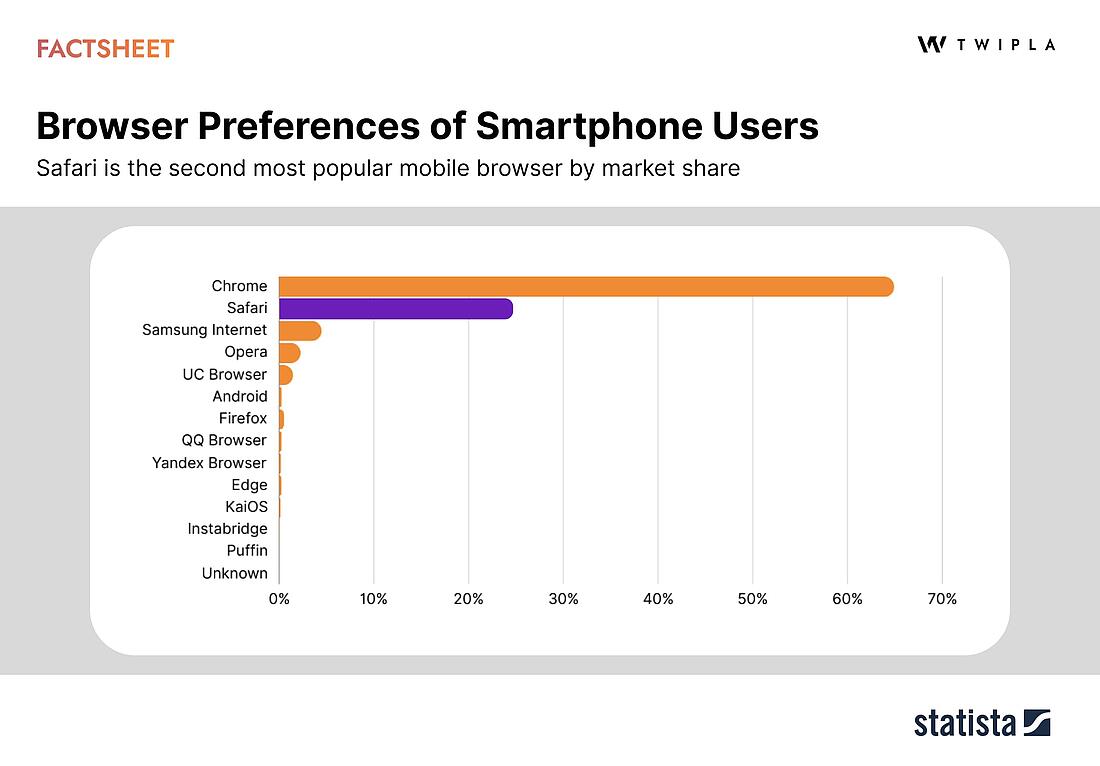- Why Us?
- Features
White Label
For SaaS Platforms & Agencies
Provide our complete analytics suite to your clients, directly within your own interface and with your/their own branding. Discover Analytics-as-a-Service and White Label Analytics. Great benefit, minimal effort.
- Pricing
- White Label
- Success Stories
- ResourcesGetting Started
Safari Browser Blocks Adobe Tracking Pixels in iOS 17 Update
Adobe has been dealt a blow with the revelation that Apple’s Sonoma update is causing Safari to block functionality of its software suite.
Released in September 2023, Safari 17.0 includes an anti-tracking system called Link TrackingProtection. When Private Browsing is activated, this technology stops its users from being tracked by automatically removing the pixels needed by Adobe Target and Adobe Experience Cloud to function.
This browsing mode is currently an option for desktop but is the default on mobile devices.
Implications for Adobe Software Suite
Adobe has more than tools that have likely also been affected in some way and internet users in Private Browsing will not benefit from their full functionality until Adobe comes up with a solution. Nor will the businesses that rely on Adobe’s software suite; their customers will have disappeared from view for those that use Adobe Analytics, for instance, though many other analytics platforms will have been similarly affected if they have a blocked tracker status.
The issue was recently discovered by Andrew Gerhardt at Loop Horizon, a London-based marketing consultation and technology firm. His business was asked to look into why Adobe Target was not working for Safari users who activated Private Browsing, and he found that the necessary Identity Cookie was not visible - something that hadn’t happened in earlier versions of Apple software. This led him to investigate further, and he published a LinkedIn post with technical details on the three testing scenarios he used to verify his findings.
Apple decides which tracking codes to block using its own streamlined version of the DuckDuckGo tracker radar list. The Silicon Valley giant also blocks Google Analytics as well as Google Tag Manager, meaning that any pixels included in this popular tracking code management dependency will also be impacted by Apple’s anti-tracking technology.
TWIPLA is not included on the blocked list. The platform uses non-invasive, cookieless tracking technology that complies with GDPR, ePrivacy, and all global privacy legislation. It also avoids the third party tracking techniques that Apple is looking to stamp out, and aligns neatly with Safari’s privacy-focused policies.
Safari blocks tracking pixels by detecting and verifying the associated JavaScript code. When a page tries to load a tracking pixel, Safari first checks whether the script comes from a blocked domain. If this is the case, it prevents the script from loading.
These tracking tags are relatively harmless. But they enable businesses to serve personalized advertisements, or to track the capacity of different digital sources to pull in website traffic. Still, they facilitate the kind of cross-site tracking that Apple is looking to curb for reasons of user privacy - even if critics argue that this does little of substance with regard to online protection.
Safari Private Browsing the Default for Mobile Users

Safari iOS for mobile now opens tabs in Private Browsing mode by default. Today, over 60% of website traffic arrives via mobile devices. Safari makes up 25% of mobile browser usage, and this large market share means that businesses that rely on Adobe’s analytics tools now have difficulty accurately understanding customers given that an unknown number of them will have this incognito mode activated.
On desktop and tablet, Safari does not open in Private Browsing by default but users are provided with this option in the application’s settings. And while information is limited, analysts believe that approximately 10% of desktop traffic accesses the internet using the private browsing option. Today, this technology is included in all browsing platforms in some form or other, including Google Chrome and Microsoft Edge.
Adobe has done little to respond to this issue for the time being. The company updated its Tracking Prevention Assessment for Apple Safari in March 2024, but there remains little there about Safari 17. Ultimately though, this is a continuation of the ongoing arms race between browser providers looking to safeguard user privacy, and other developers looking for new ways to overcome these measures.
This problem with Adobe was discovered by an external source. If there are any errors in the article, please let us know by writing to support@twipla.com.
TWIPLA is a market-leading website intelligence solution. Our platform provides 40+ real-time web statistics, behavior analytics tools, and visitor communication modules. Powered by advanced cookieless tracking technology, businesses can leverage analytics in absolute compliance with all global privacy legislation.
Share article
Get Started for Free
Gain World-Class Insights & Offer Innovative Privacy & Security

You might also like
42 Essential KPIs for eCommerce Websites 07 February 2021 - by Simon Coulthard
07 February 2021 - by Simon Coulthard










